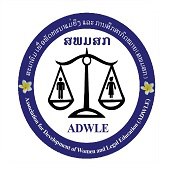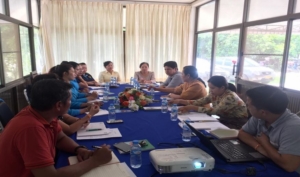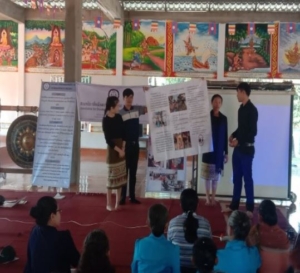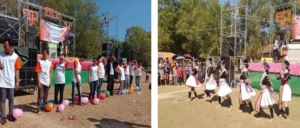Project
New innovations for strengthening access to justice for vulnerable women in Laos
-
Amount Funded
76,599 EUROProject Duration
01 May 2018 - 30 Apr 2020 -
-
Lead organisation
-
The Association for Development of Women and Legal Education (ADWLE) is a Non-Profit Association (NPA) in Laos. Originally called the Women’s Rights Study Association, the Association was created unofficially in 2008 by a CEDAW Resource Pool, consisting of 10 women and two men, with the intention to promote gender equality and women’s rights in Lao PDR. The founders of ADWLE applied to be an NPA with the Ministry of Home Affairs (MOHA) in 2010. In April 2012, ADWLE was given a temporary license, after which, it elected five Administrative and Inspection Board members. ADWLE was registered on 9 November 2012 in Vientiane Capital, Lao PDR. Since its inception, ADWLE has worked with the Faculties of Law and Political Sciences of the National University of Laos (NUoL), Vientiane Capital, and Champasak University, Champasak Province, as well as with targeted village communities. Their projects have focused largely on: legal education relating to gender and national and international women’s rights laws and instruments; capacity building, in the form of trainings and outreach activities; and, most recently, the provision of free legal advice and assistance to female victims of gender-based violence. At present, ADWLE has six staff working full time: Director, Gender Manager, Law Manager, Financial and Administrative Officer, Project Support Manager and Project Assistant. They have academic and professional backgrounds in a variety of fields, including law, political science, finance, agriculture, and education. The team works actively in the field to promote gender equality, women’s rights and the protection of women from human trafficking. The legal aid clinic is run by a principal lawyer and nine part-time lawyers. In order to assist with carrying out its activities, ADWLE has a variety of partners, including the Faculties of Law and Political Sciences of NUoL and Champasak Universities, the National Commission for the Advancement of Women, the National Assembly, the Ministry of Justice, the Lao Bar Association and numerous international organisations and local civil society organisations.
-
Organisation
The Association for Development of Women and Legal Education (ADWLE) is a Non-Profit Association (NPA) in Laos. Originally called the Women’s Rights Study Association, the Association was created unofficially in 2008 by a CEDAW Resource Pool, consisting of 10 women and two men, with the intention to promote gender equality and women’s rights in Lao PDR. The founders of ADWLE applied to be an NPA with the Ministry of Home Affairs (MOHA) in 2010. In April 2012, ADWLE was given a temporary license, after which, it elected five Administrative and Inspection Board members. ADWLE was registered on 9 November 2012 in Vientiane Capital, Lao PDR. Since its inception, ADWLE has worked with the Faculties of Law and Political Sciences of the National University of Laos (NUoL), Vientiane Capital, and Champasak University, Champasak Province, as well as with targeted village communities. Their projects have focused largely on: legal education relating to gender and national and international women’s rights laws and instruments; capacity building, in the form of trainings and outreach activities; and, most recently, the provision of free legal advice and assistance to female victims of gender-based violence. At present, ADWLE has six staff working full time: Director, Gender Manager, Law Manager, Financial and Administrative Officer, Project Support Manager and Project Assistant. They have academic and professional backgrounds in a variety of fields, including law, political science, finance, agriculture, and education. The team works actively in the field to promote gender equality, women’s rights and the protection of women from human trafficking. The legal aid clinic is run by a principal lawyer and nine part-time lawyers. In order to assist with carrying out its activities, ADWLE has a variety of partners, including the Faculties of Law and Political Sciences of NUoL and Champasak Universities, the National Commission for the Advancement of Women, the National Assembly, the Ministry of Justice, the Lao Bar Association and numerous international organisations and local civil society organisations.
-
Project
Previous to Voice, Association for the Development of Women and Legal Education (ADWLE) pioneered an approach to gender-based violence in 9 target villages in Vientiane Capital. In these communities, gender based violence and domestic violence have been identified as a significant problem facing women. In aiming to address this problem, ADWLE has identified several major causes of gender inequality which lead to many types of gender-discriminatory practices, such as gender-discriminatory attitudes about gender roles (ie women should serve men, not make decisions); lack of knowledge on gender and gender-related laws by Village Authorities and villagers; high tolerance for GBV in the community by both men and women; use of customary laws which are unfavourable to women; lack of enforcement of domestic laws by law enforcement bodies; lack of knowledge on safe migration; and drug and alcohol abuse. In interviews conducted in participating communities at the beginning of the project in all four villages, on 13/07/2015, 70% of women villagers said they experience some form of gender inequality. Furthermore, at the first official level of dispute mediation, Village Authorities and Village Mediation centre often have little knowledge of gender issues or domestic laws related to domestic violence. Domestic violence cases are often resolved at this level without going further, however authorities lack of knowledge on gender issues and domestic laws against domestic violence make it difficult to come to a solution which is fair for the victim in the case. ADWLE has been implementing a series of activities for villagers and Village Authorities on women’s rights, CEDAW, gender sensitive mediation methodology, as well as raising awareness in the communities about drugs, human trafficking and domestic laws which make domestic violence illegal. This project has encompassed many different approaches and activities which have reduced marginalisation of women and girls, particularly of ethnic minorities by empowering women and girls to have the capacity to know their rights, and lobby for them in their local community. Building on the results of the above, and with the Voice funding, ADWLE aims to test more innovative approaches in dealing with gender (in)equality. Many activities will continue on from the first phase, however ADWLE aims to support a stronger engagement with gender issues at the grassroots and community level in 2 specific areas, with the goal of shifting the focus from traditional training and workshops to more participatory methods. This shift in focus involves changes in some of the types of activities that are done at Village level to be more participatory and less focused on top-down traditional training. ADWLE implements the GALS methodology in trainings with newly married couples from target villages who will become gender champions and key change makers in the community. It also facilitates the creation of two advocacy groups to be run by villagers; Women’s Champions, and Men Standing Up. There are gender-separated groups for women and men to be trained and to advocate for women’s rights, and they are supported by the Gender Champions who participate in GALS training. This project also involves expanding the reach of ADWLE’s support for access to legal education with the opening of the Women’s Assistance and Counselling Unit (WACU) in the centre of Vientiane Capital City. This is because, though the first phase of the project saw several successes, ADWLE wants to support increased community engagements with gender and legal issues the first phase dealt with.
-
-
Previous to Voice, Association for the Development of Women and Legal Education (ADWLE) pioneered an approach to gender-based violence in 9 target villages in Vientiane Capital. In these communities, gender based violence and domestic violence have been identified as a significant problem facing women. In aiming to address this problem, ADWLE has identified several major causes of gender inequality which lead to many types of gender-discriminatory practices, such as gender-discriminatory attitudes about gender roles (ie women should serve men, not make decisions); lack of knowledge on gender and gender-related laws by Village Authorities and villagers; high tolerance for GBV in the community by both men and women; use of customary laws which are unfavourable to women; lack of enforcement of domestic laws by law enforcement bodies; lack of knowledge on safe migration; and drug and alcohol abuse. In interviews conducted in participating communities at the beginning of the project in all four villages, on 13/07/2015, 70% of women villagers said they experience some form of gender inequality. Furthermore, at the first official level of dispute mediation, Village Authorities and Village Mediation centre often have little knowledge of gender issues or domestic laws related to domestic violence. Domestic violence cases are often resolved at this level without going further, however authorities lack of knowledge on gender issues and domestic laws against domestic violence make it difficult to come to a solution which is fair for the victim in the case. ADWLE has been implementing a series of activities for villagers and Village Authorities on women’s rights, CEDAW, gender sensitive mediation methodology, as well as raising awareness in the communities about drugs, human trafficking and domestic laws which make domestic violence illegal. This project has encompassed many different approaches and activities which have reduced marginalisation of women and girls, particularly of ethnic minorities by empowering women and girls to have the capacity to know their rights, and lobby for them in their local community. Building on the results of the above, and with the Voice funding, ADWLE aims to test more innovative approaches in dealing with gender (in)equality. Many activities will continue on from the first phase, however ADWLE aims to support a stronger engagement with gender issues at the grassroots and community level in 2 specific areas, with the goal of shifting the focus from traditional training and workshops to more participatory methods. This shift in focus involves changes in some of the types of activities that are done at Village level to be more participatory and less focused on top-down traditional training. ADWLE implements the GALS methodology in trainings with newly married couples from target villages who will become gender champions and key change makers in the community. It also facilitates the creation of two advocacy groups to be run by villagers; Women’s Champions, and Men Standing Up. There are gender-separated groups for women and men to be trained and to advocate for women’s rights, and they are supported by the Gender Champions who participate in GALS training. This project also involves expanding the reach of ADWLE’s support for access to legal education with the opening of the Women’s Assistance and Counselling Unit (WACU) in the centre of Vientiane Capital City. This is because, though the first phase of the project saw several successes, ADWLE wants to support increased community engagements with gender and legal issues the first phase dealt with.
-
Based on the GALS methodology, newly married couples – divided in men’s and women’s groups – learned how to think about envisioning and mapping out their lives’ journeys and goals related to these journeys. Some were commonly expected goals (such as to improve their house and land, raise more animals, buy a motorbike or equipment), but some participants had more creative longer-term goals (such as planting rubber trees, set ting up a cafe or barber shop, small projects for women’s development in the village), indicating that this activity was quite successful in encouraging them to think for the future. 46 community members (34 women) attended the Training of Trainers (ToT) on GALS. The objective was to build their knowledge and confidence to become grassroots gender advocates or ‘champions’ in their own communities. Through learning by doing, participants gained skills in facilitation and the preparation of trainings and other meetings. In follow-up discussions with participants, many reported they had shared their knowledge with relatives and friends within their villages (reaching approximately 350 people).
Community outreach to disseminate legal information was mainly based on WACO staff visiting 5 target villages to disseminate information about relevant laws related to women, CEDAW, gender, GBV, Human Trafficking. At the same time, the staff promoted awareness on the availability of free legal services through WACO. Concurrently, a mobile legal clinic was also set up in the village, so that villagers could drop in for immediate legal counselling. 3 clients came to use the mobile clinic services. A video about WACO’s services was produced and made available in November 2020. This became new method to advertise WACO’s scope of expertise and services and to encourage communities to come to WACO for legal information and services. Moreover, trainers and facilitators from the Vientiane Capital Prosecutors’ Office and the Ministry of Labour and Social Welfare were invited to lecture on laws related to human trafficking and labour migration to participants. Although not an innovative way to engage participants, formal lecture-style delivery of information was still useful to help educate on complex issues such as these.
Photos
Caption1: Consultation Workshop on WACO operation with village authorities of Saysetha district, Vientiane.

Caption2: Dissemination on location and role’s WACO and laws at Saysetha district, Vientiane.

Caption4: At target villages Xaythany district, Vientiane.







